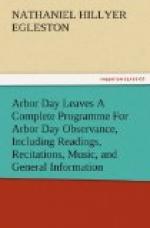is precisely that which is done in the wonderful laboratory
of the leaf. Under the magic touch of the sun,
the carbonic acid of the atmosphere which has entered
the leaf through the breathing pores or stomates and
is circulating through the air-passages and cells,
is decomposed, that is, taken to pieces; the oxygen
is poured out into the air along with the watery vapor
of the crude sap, while the carbon is combined with
the elements of water and other substances which we
have mentioned, to form the elaborated sap or plant-material
which is now ready to be carried from the leaves to
all parts of the plant or tree, to nourish it and
continue its growth. Such is the important and
wonderful work of the leaf, the tender, delicate leaf,
which we crumple so easily in our fingers. It
builds up, atom by atom, the tree and the great forests
which beautify the world and provide for us a thousand
comforts and conveniences. Our houses and the
furniture in them, our boats and ships, the cars in
which we fly so swiftly, the many beautiful and useful
things which are manufactured from wood of various
kinds, all these, by the help of the sun, are furnished
us by the tiny leaves of the trees.
BRYANT, THE POET OF TREES.
“It is pleasant,” as Mr. George W. Curtis has said, “to remember, on Arbor Day, that Bryant, our oldest American poet and the father of our American literature, is especially the poet of trees. He grew up among the solitary hills of western Massachusetts, where the woods were his nursery and the trees his earliest comrades. The solemnity of the forest breathes through all his verse, and he had always, even in the city, a grave, rustic air, as of a man who heard the babbling brooks and to whom the trees told their secrets.”
His “Forest Hymn” is familiar to many, but it cannot be too familiar. It would be well if teachers would encourage their pupils to commit the whole, or portions of it, at least, to memory. Let it be made a reading lesson, but, in making it such, let pains be taken to point out its felicities of expression, its beautiful moral tone and lofty sentiment, and its wise counsels for life and conduct. Nothing could be more appropriate, especially for the indoor portion of the Arbor Day exercises, than to have this poem, or portions of it, read by some pupil in full sympathy with its spirit, or by some class in concert.
Forest hymn.
The groves were God’s
first temples, ere man learned
To hew the shaft and lay the
architrave
And spread the roof above
them, ere he framed
The lofty vault to gather
and roll back
The sound of anthems; in the
darkling wood,
Amidst the cool and silence,
he knelt down
And offered to the Mightiest
solemn thanks
And supplications. For
his simple heart
Might not resist the sacred
influences
Which from the stilly twilight




